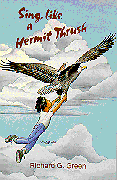


|
Sing Like A Hermit Thrush.
Richard G. Green. Subject Headings:
Grades 4 - 9 / Ages 9 - 14. **/4
|

excerpt:
" "Like today. I knew I was going to hit a home run and win the game."Richard G. Green has previously written for New World Indians publications, and has published a book, "The Last Raven and Other Stories". "Sing, Like a Hermit Thrush" will appeal to boys, especially those who live on Indian Reservations, familiarly referred to as the "Rez" by Darrin, chief character in the story. The cover of the book is attractive with an imaginative painting by artist Raymond Skye of a realistic eagle soaring into the sky with a hermit thrush on its back, and Darrin clinging to its legs."How'd you know that?"
Darrin pulled out his rabbit's foot. "Because HE tells me." He handed the rabbit's foot to Totah. "When something's gonna happen he gets kinda warm."
Totah felt the rabbit's foot and dangled it. "It don't feel warm to me," he said.
"It's not warm now because nothing's gonna happen now."
Totah gave Darrin the rabbit's foot. "I used to know a seer once," he said. "Long time ago." He picked up his cup and took a drink. "Maybe you should go down to the river and see Truman Cloud. He's in atohwitshera* and knows about orenda.**"
" * atohwitshera = The Society of Faces
** orenda = spiritual power
Darrin has visions or dreams that give him the power to see into
the future. This puzzles and upsets him until he comes to terms with it
through talking to his grandfather (see excerpt) and Truman Cloud. He is
helped over another hurdle in his life when Fox teaches him to defend
himself against the bully, Arley.
Perhaps this reviewer, as an older woman, is too critical. I
found some of the language offensive and the story did not flow well. Why
is Darrin's last name, Captain, never mentioned until it is called out at
a baseball game? Then Darrin, thinking the coach is calling him,
mistakenly answers, when in reality the coach is calling for the Captain
of the team. The incident falls flat because the reader has not learned
up to this point in the story that Darrin's last name is Captain.
What happened to Darren's parents? They are mentioned early in
the story, but never appear again. Why does he live with his cousin Brenda?
On a positive note, Mohawk words are scattered throughout the
book which is rather intriguing since a glossary or "ohenton" at the front
of the book gives English translations. The celebrations at an Indian
wedding, a pow-wow, and costumes for Indian dancers are described adding
further insights into life on a Reservation.
Because of the language, and the above inconsistencies I would
recommend this story with lower case "r" reservations for selected readers
only.
Recommended with reservations.
Joan Payzant is a retired teacher/librarian living in Dartmouth, Nova Scotia.

To comment on this title or this review, send mail to cm@umanitoba.ca.
Copyright © 1996 the Manitoba Library Association. Reproduction for personal use is permitted only if this copyright notice is maintained. Any other reproduction is prohibited without permission.
Published by
The Manitoba Library Association
ISSN 1201-9364
AUTHORS |
TITLES |
MEDIA REVIEWS
BACK ISSUES |
SEARCH |
HOME